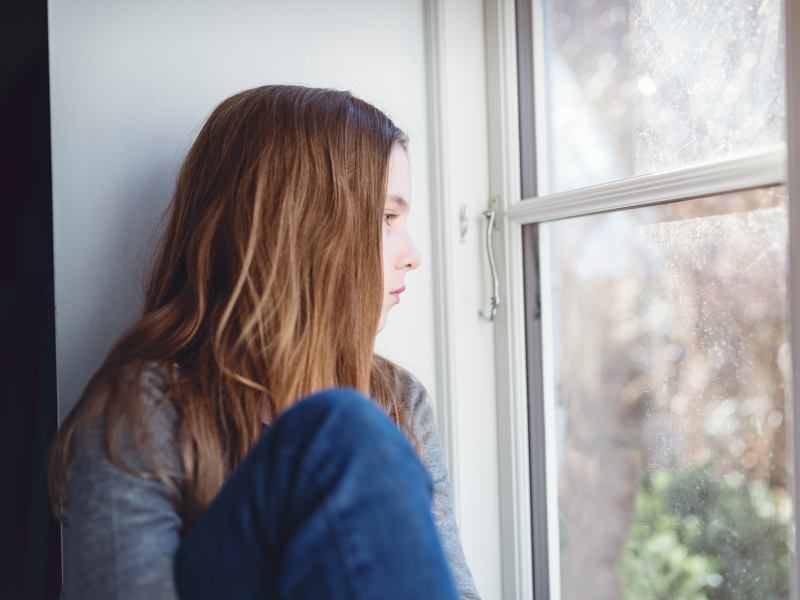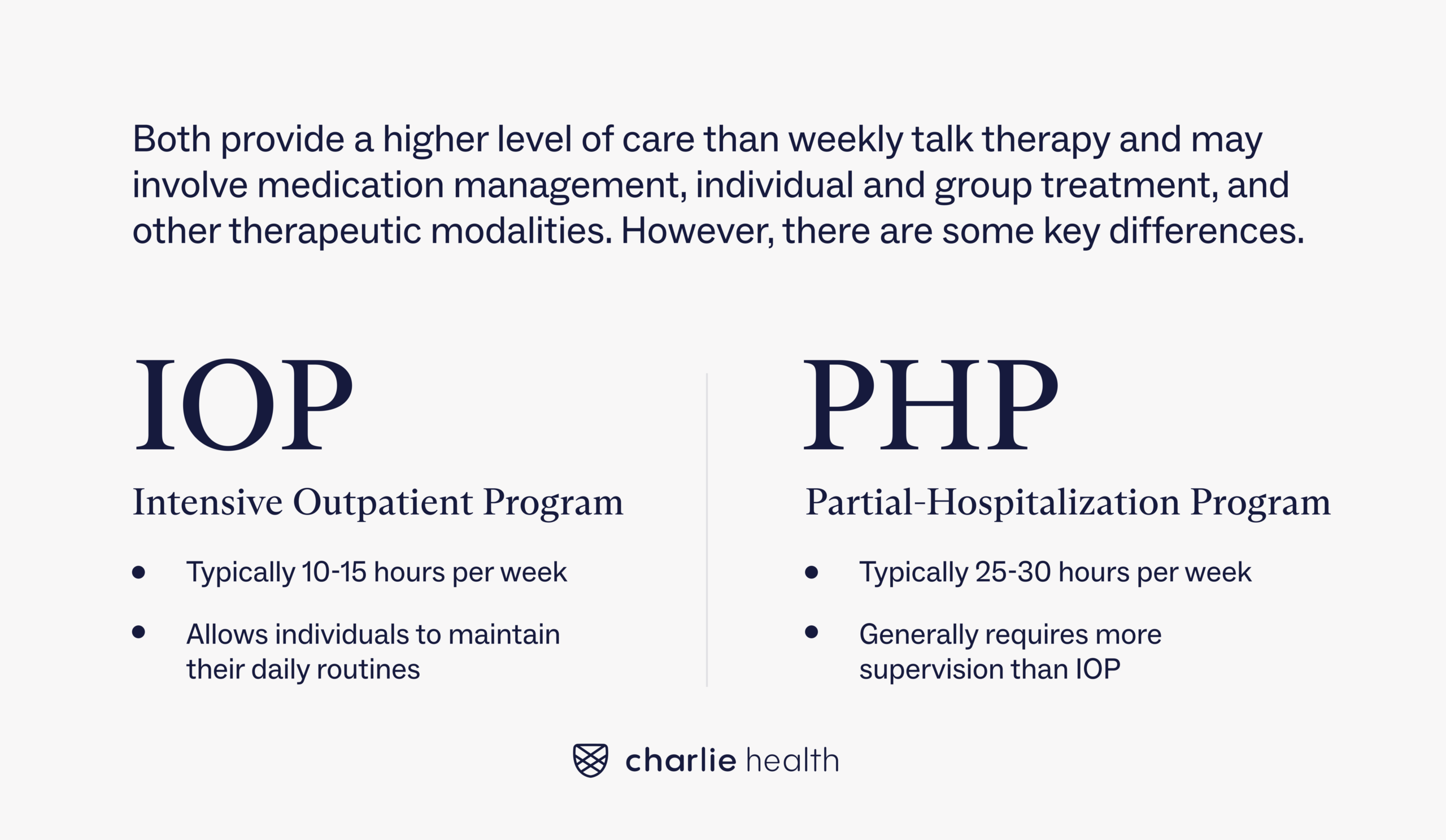
Table of Contents
PHP vs IOP: What Are the Differences?
Written By: Charlie Health Editorial Team

Clinically Reviewed By: Dr. Don Gasparini
Updated: June 13, 2024
6 min.
Intensive outpatient programs (IOPs) and partial hospitalization programs (PHPs) are both intensive therapy options, but they have distinct differences in duration, structure, supervision, and cost.
Learn more about our Clinical Review Process
Table of Contents

Therapy is frequently thought of as one-on-one sessions with a mental healthcare provider, but in reality, there is a wide range of therapeutic services available beyond once-weekly outpatient care — including partial hospitalization programs (PHP) and intensive outpatient programs (IOP). Both of these mental health treatment programs provide more than once weekly support to people struggling with serious mental health conditions but don’t offer as much supervision as inpatient care. However, there are some distinct differences between PHP and IOP. Below, we delve into the differences between these intensive treatment options and explore how to find the right treatment for you.

Begin virtual IOP at Charlie Health
A personalized, comprehensive treatment solution.
What is a partial hospitalization program (PHP)?
A PHP typically involves more intensive treatment than an IOP but is less intensive than inpatient treatment. PHPs often require patients to attend treatment for several hours a day, multiple days a week, and may include medication management, individual therapy, group sessions, and other treatment modalities. PHPs are usually designed for people who require more support than an outpatient program can provide but do not require 24-hour care in an inpatient hospital setting.
What is an intensive outpatient program (IOP)?
An IOP is a step down from a PHP but is more intensive than once-weekly outpatient therapy. It is designed to provide structured, focused treatment to individuals while allowing them to maintain their daily responsibilities and routines. IOP typically involves attending therapy for several hours a day, multiple days a week, and may include individual therapy, group sessions, medication management, and other evidence-based interventions. IOP treatment is sometimes designed for people who have completed a PHP program or who require less intensive treatment than a PHP.
What are the differences between PHP and IOP programs?
The main difference between PHP and IOP is the intensity of mental health treatment provided. PHP treatment is a more intensive treatment program that requires more time commitment than outpatient treatment, while IOP treatment provides less intensive mental health treatment that allows patients to maintain their daily responsibilities and routines. Both treatment programs can be effective in helping people manage their mental health issues and can be tailored to meet the specific needs of each individual. Here are some key differences between PHP and IOP programs.
PHP
IOP
- Patients usually attend treatment 5-7 days per week with 4-6 hours of treatment per day
- Highly structured environment with integrated care
- Higher level of medical supervision
- Typically more expensive
- Patients usually attend treatment 3-5 days per week with 2-4 hours of treatment per day
- Structured but flexible environment that lets people participate in daily activities
- Structured therapy sessions with less medical oversight
- Typically less expensive
Duration
Patients typically attend PHPs for 5-7 days a week, with each session lasting 4-6 hours a day. By contrast, patients typically attend IOPs for 3-5 days a week, with each session lasting 2-4 hours a day.
Structure
PHPs provide a highly structured environment with a strong emphasis on medical and psychiatric care, including medication management, individual therapy, group sessions, and other therapeutic activities. IOPs provide a structured but more flexible environment that includes individual therapy, group sessions, and skill-building sessions, but with less medical oversight than PHPs.
Supervision
PHPs provide more direct supervision and higher medical oversight compared to IOPs. In PHPs, patients are closely monitored by a multidisciplinary team, including psychiatrists and nurses, who are available to address immediate medical or psychiatric needs and make necessary medication adjustments. By contrast, IOPs offer structured therapy sessions with less frequent medical oversight, focusing more on therapeutic interventions and skill-building, making them suitable for people stable enough to manage their symptoms with less continuous medical supervision.
Cost
The cost difference between PHPs and IOPs varies based on factors like location, program specifics, treatment duration, and services provided. However, overall, PHPs are typically more expensive because they offer intensive daily or near-daily sessions, sometimes requiring on-site medical supervision. By contrast, IOPs provide structured therapy with fewer weekly hours, resulting in lower costs due to reduced staff and facility needs.
What are the treatment modalities used in PHPs and IOPs?
Despite their differences, PHPs and IOPs both typically utilize similar therapy practices to support clients throughout their healing journey. Overall, both types of mental health treatment programs aim to provide a supportive and structured environment where individuals can receive the care and support they need to manage their mental health or, in some cases, substance use disorder (SUD) and improve their overall quality of life. Here’s an overview of the treatment modalities used in PHP and IOP programs.
Individual therapy
Individual therapy sessions with a therapist may help the client work through specific issues or concerns.
Group sessions
Group sessions and supported groups with other individuals in the treatment program may provide a support system and help individuals learn from one another’s experiences.
Behavioral therapies
PHPs may offer behavioral therapies, such as cognitive behavioral therapy (CBT), dialectical behavior therapy (DBT) skills, and other evidence-based treatment modalities to help individuals develop coping skills and strategies to manage their symptoms.
Family therapy
Family therapy sessions may be available to help individuals and their loved ones address issues that are impacting their mental health and relationships.
PHP vs IOP: Which is the right fit?
There’s robust data that both IOPs and PHPs can effectively treat mental health issues for people. For example, a 2015 literature review found that IOPs significantly reduce alcohol and drug use and improve mental health among people struggling with substance use disorder (SUD). A similar review of PHPs found that the programs are a cost-effective option for many patients who need more intensive care, especially in improving social functioning without entirely disrupting a patient’s environment.
However, determining whether IOP treatment or PHP is the right treatment for a loved one can be challenging. Both programs can be effective treatment options for individuals with high acuity mental health issues. The effectiveness of each program will depend on several factors, including the individual’s specific needs and circumstances, the quality of the program, and the treatment approach used. Here are some factors to consider when deciding between a PHP or IOP for a loved one.
Level of mental health support needed
A PHP may be more effective for some individuals as it provides more intensive treatment and support than an IOP. For others, an IOP may be sufficient and more appropriate, as it allows them to receive treatment while maintaining some level of independence and engaging in their daily activities.
Level of structure needed
IOPs may be a better fit for some people requiring less structure or support than PHP. IOPs allow people to receive treatment while staying in school and participating in sports, arts, or other extracurricular activities. PHPs, on the other hand, could be a better fit for people who require a higher level of treatment and structure but don’t need inpatient care (like a residential treatment program). PHPs provide a more structured and supportive environment, benefiting people experiencing severe mental health issues.
Level of support available outside of treatment
IOPs are also appropriate for people with a supportive home environment or support system and the ability to follow through with treatment recommendations relatively independently. A PHP could be a better choice for a person with limited support outside of treatment because it offers intensive care with daily or near-daily therapy sessions and on-site medical support. It also often include opportunities for social interaction and peer support, which can be crucial for people who lack a strong support network outside of treatment.

How Charlie Health can help
If you need some extra mental health support, Charlie Health is here to help. Charlie Health’s virtual Intensive Outpatient Program (IOP) provides more than once-weekly mental health treatment for people and families dealing with serious mental health conditions. Whether you’re leaving a higher level of care, like a PHP or residential treatment program, or need more support than outpatient care, Charlie Health is here for you. Our expert clinicians incorporate evidence-based therapies into individual counseling, family therapy, and group sessions. With this kind of holistic treatment, managing your mental health is possible. Fill out the form below or give us a call to start healing today.





